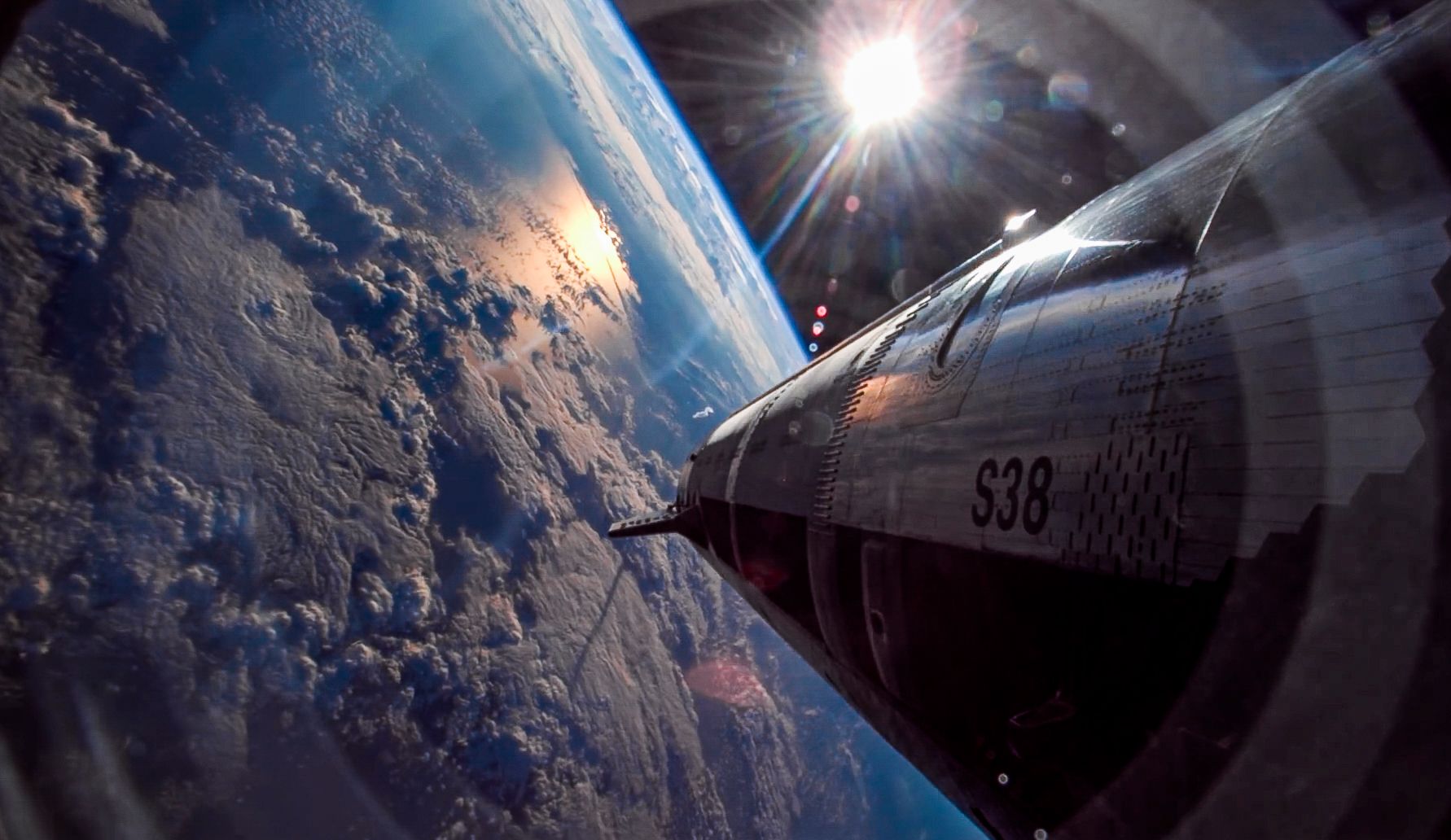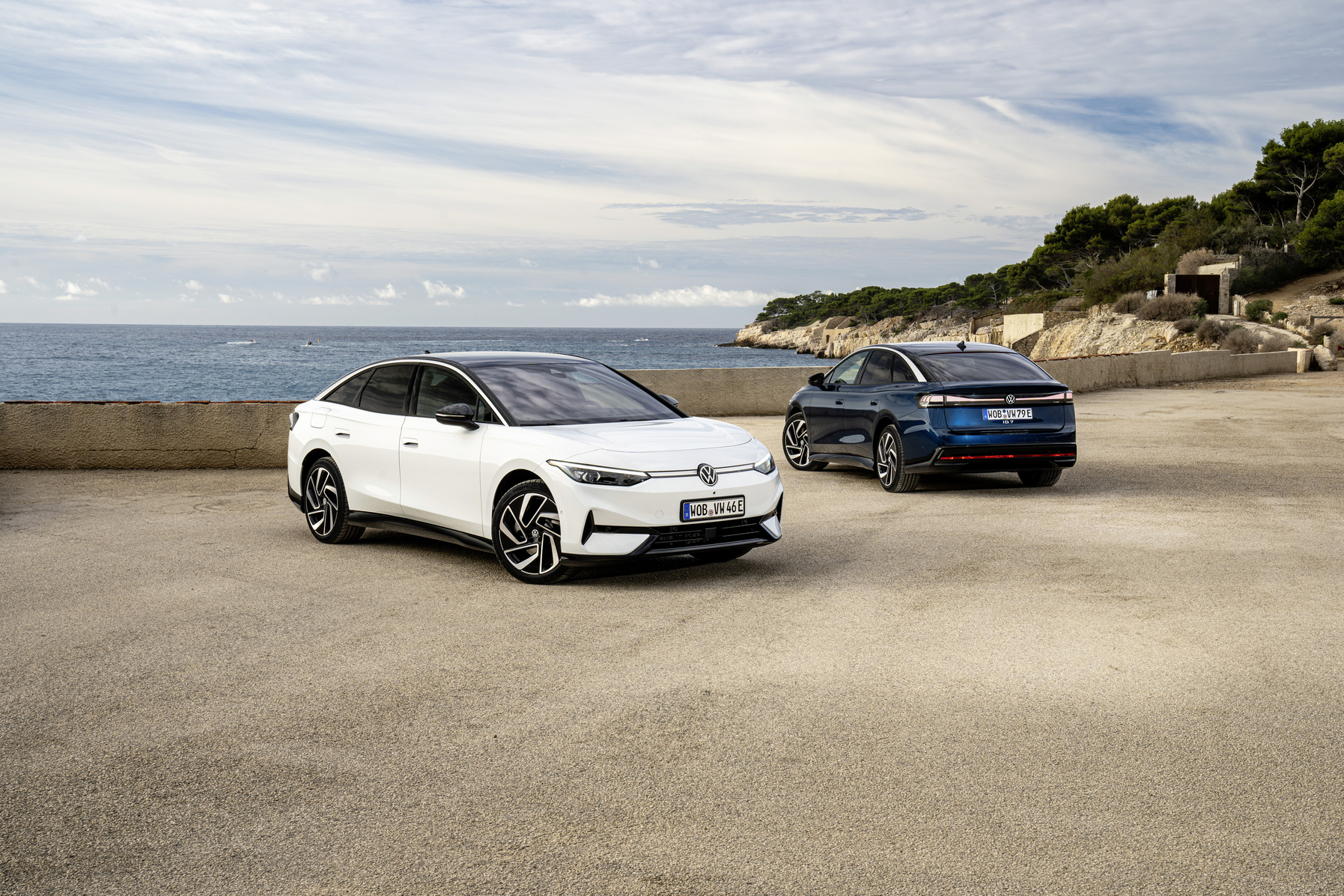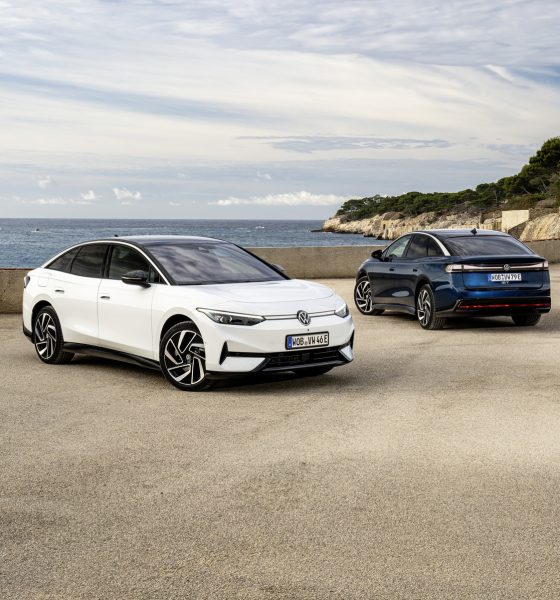German automaker Volkswagen has reported its full-year 2023 delivery numbers, featuring more deliveries of battery electric vehicles (BEVs) than ever before. Still, the company remains far off from the world’s top EV seller, though the company has emphasized that its products are heading in the right direction.
In a press release shared on Tuesday, Volkswagen reported 394,000 BEV deliveries worldwide in 2023, marking a 21.1 percent increase year over year. The automaker reached 4.87 million vehicle deliveries overall, meaning the company’s BEV deliveries represented roughly 8 percent of its total sales.
Despite the ratio of BEVs to all of its vehicles being somewhat small, Volkswagen highlights in the release that the figure represents a continued interest in the emerging technology from its consumers.
“The delivery figures show that we are on the right track as a brand and that our cars are well received by our customers,” said Imelda Labbé, Volkswagen Board Member for sales, marketing and after sales. “We expect the market environment to remain challenging in 2024. But with our revised and attractive product portfolio, we are in the right position.”
The company is also entering 2024 with optimism surrounding its upcoming models. Notably, Volkswagen says it plans to launch the ID.7 Tourer, its “estate version” of the ID.7, this year, along with the next-generation of the Golf, and updated drive systems and operating concepts for its previously available ID.4 and ID.5 BEVs.
As for key markets in 2023, Volkswagen says it sold the most BEVs in China, Germany, the U.S., the United Kingdom, Sweden, France, Norway and Belgium. A key highlight for BEV sales was in Germany, where the brand sold roughly 30,000 ID.4 units for a 62.9 percent jump year over year.
Worldwide, Volkswagen fell behind many BEV makers, while it still outpaced some traditional gas car manufacturers. By comparison, BEV market leader Tesla sold over 1.8 million vehicles globally in 2023, while BYD reported around 1.6 million BEVs sold, with many of its over 3 million vehicle sales coming from plugin hybrids and gas cars (via Reuters).
Behind Volkswagen were traditional gas automakers and some startup BEV makers that are still ramping up production. For example, Ford reported 72,608 BEVs sold in 2023, up 18 percent year over year, while electric truck manufacturer Rivian delivered 50,122 units.
Volkswagen to offer ChatGPT in its vehicles starting this year
What are your thoughts? Let me know at zach@teslarati.com, find me on X at @zacharyvisconti, or send your tips to us at tips@teslarati.com.

News
Tesla ends Full Self-Driving purchase option in the U.S.
In January, Musk announced that Tesla would remove the ability to purchase the suite outright for $8,000. This would give the vehicle Full Self-Driving for its entire lifespan, but Tesla intended to move away from it, for several reasons, one being that a tranche in the CEO’s pay package requires 10 million active subscriptions of FSD.

Tesla has officially ended the option to purchase the Full Self-Driving suite outright, a move that was announced for the United States market in January by CEO Elon Musk.
The driver assistance suite is now exclusively available in the U.S. as a subscription, which is currently priced at $99 per month.
Tesla moved away from the outright purchase option in an effort to move more people to the subscription program, but there are concerns over its current price and the potential for it to rise.
In January, Musk announced that Tesla would remove the ability to purchase the suite outright for $8,000. This would give the vehicle Full Self-Driving for its entire lifespan, but Tesla intended to move away from it, for several reasons, one being that a tranche in the CEO’s pay package requires 10 million active subscriptions of FSD.
Although Tesla moved back the deadline in other countries, it has now taken effect in the U.S. on Sunday morning. Tesla updated its website to reflect this:
🚨 Tesla has officially moved the outright purchase option for FSD on its website pic.twitter.com/RZt1oIevB3
— TESLARATI (@Teslarati) February 15, 2026
There are still some concerns regarding its price, as $99 per month is not where many consumers are hoping to see the subscription price stay.
Musk has said that as capabilities improve, the price will go up, but it seems unlikely that 10 million drivers will want to pay an extra $100 every month for the capability, even if it is extremely useful.
Instead, many owners and fans of the company are calling for Tesla to offer a different type of pricing platform. This includes a tiered-system that would let owners pick and choose the features they would want for varying prices, or even a daily, weekly, monthly, and annual pricing option, which would incentivize longer-term purchasing.
Although Musk and other Tesla are aware of FSD’s capabilities and state is is worth much more than its current price, there could be some merit in the idea of offering a price for Supervised FSD and another price for Unsupervised FSD when it becomes available.
Elon Musk
Musk bankers looking to trim xAI debt after SpaceX merger: report
xAI has built up $18 billion in debt over the past few years, with some of this being attributed to the purchase of social media platform Twitter (now X) and the creation of the AI development company. A new financing deal would help trim some of the financial burden that is currently present ahead of the plan to take SpaceX public sometime this year.

Elon Musk’s bankers are looking to trim the debt that xAI has taken on over the past few years, following the company’s merger with SpaceX, a new report from Bloomberg says.
xAI has built up $18 billion in debt over the past few years, with some of this being attributed to the purchase of social media platform Twitter (now X) and the creation of the AI development company. Bankers are trying to create some kind of financing plan that would trim “some of the heavy interest costs” that come with the debt.
The financing deal would help trim some of the financial burden that is currently present ahead of the plan to take SpaceX public sometime this year. Musk has essentially confirmed that SpaceX would be heading toward an IPO last month.
The report indicates that Morgan Stanley is expected to take the leading role in any financing plan, citing people familiar with the matter. Morgan Stanley, along with Goldman Sachs, Bank of America, and JPMorgan Chase & Co., are all expected to be in the lineup of banks leading SpaceX’s potential IPO.
Since Musk acquired X, he has also had what Bloomberg says is a “mixed track record with debt markets.” Since purchasing X a few years ago with a $12.5 billion financing package, X pays “tens of millions in interest payments every month.”
That debt is held by Bank of America, Barclays, Mitsubishi, UFJ Financial, BNP Paribas SA, Mizuho, and Société Générale SA.
X merged with xAI last March, which brought the valuation to $45 billion, including the debt.
SpaceX announced the merger with xAI earlier this month, a major move in Musk’s plan to alleviate Earth of necessary data centers and replace them with orbital options that will be lower cost:
“In the long term, space-based AI is obviously the only way to scale. To harness even a millionth of our Sun’s energy would require over a million times more energy than our civilization currently uses! The only logical solution, therefore, is to transport these resource-intensive efforts to a location with vast power and space. I mean, space is called “space” for a reason.”
The merger has many advantages, but one of the most crucial is that it positions the now-merged companies to fund broader goals, fueled by revenue from the Starlink expansion, potential IPO, and AI-driven applications that could accelerate the development of lunar bases.
News
Tesla pushes Full Self-Driving outright purchasing option back in one market
Tesla announced last month that it would eliminate the ability to purchase the Full Self-Driving software outright, instead opting for a subscription-only program, which will require users to pay monthly.

Tesla has pushed the opportunity to purchase the Full Self-Driving suite outright in one market: Australia.
The date remains February 14 in North America, but Tesla has pushed the date back to March 31, 2026, in Australia.
NEWS: Tesla is ending the option to buy FSD as a one-time outright purchase in Australia on March 31, 2026.
It still ends on Feb 14th in North America. https://t.co/qZBOztExVT pic.twitter.com/wmKRZPTf3r
— Sawyer Merritt (@SawyerMerritt) February 13, 2026
Tesla announced last month that it would eliminate the ability to purchase the Full Self-Driving software outright, instead opting for a subscription-only program, which will require users to pay monthly.
If you have already purchased the suite outright, you will not be required to subscribe once again, but once the outright purchase option is gone, drivers will be required to pay the monthly fee.
The reason for the adjustment is likely due to the short period of time the Full Self-Driving suite has been available in the country. In North America, it has been available for years.
Tesla hits major milestone with Full Self-Driving subscriptions
However, Tesla just launched it just last year in Australia.
Full Self-Driving is currently available in seven countries: the United States, Canada, China, Mexico, Australia, New Zealand, and South Korea.
The company has worked extensively for the past few years to launch the suite in Europe. It has not made it quite yet, but Tesla hopes to get it launched by the end of this year.
In North America, Tesla is only giving customers one more day to buy the suite outright before they will be committed to the subscription-based option for good.
The price is expected to go up as the capabilities improve, but there are no indications as to when Tesla will be doing that, nor what type of offering it plans to roll out for owners.










